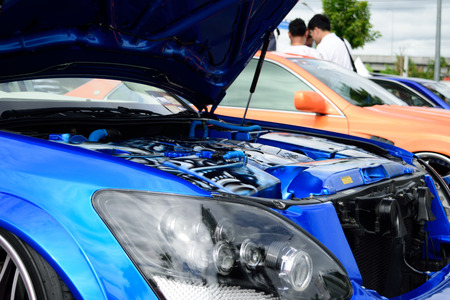1. Introduction: The Thriving UK Motorsport Scene
From the legendary Silverstone Circuit to bustling local karting tracks, motorsport is woven into the very fabric of British culture. Across the United Kingdom, a deep-rooted passion for racing unites fans and drivers of all backgrounds, forming a vibrant community that thrives on speed, skill, and shared enthusiasm. The UKs motorsport scene goes far beyond professional races; it’s a landscape filled with grassroots events, classic car rallies, and weekend meet-ups at iconic venues. This thriving environment not only fuels adrenaline but also fosters meaningful connections among like-minded individuals. Car clubs play a pivotal role in this community, providing a hub for enthusiasts to share knowledge, offer hands-on technical support, and celebrate their love for all things automotive. Whether you’re tuning up your classic Mini or preparing your track day weapon, the camaraderie found within these clubs truly embodies the spirit of British motorsport.
2. What Are Car Clubs? British Traditions and Culture
Car clubs in the UK are more than just gatherings of motoring enthusiasts; they are vital institutions that have shaped the country’s rich motorsport heritage. A car club typically brings together individuals with a shared passion for cars, whether its classic British marques like MG and Jaguar or modern performance vehicles. Members join to exchange technical know-how, participate in events, and enjoy camaraderie, all while preserving automotive traditions unique to the UK.
The roots of car clubs in Britain stretch back to the early 20th century, when groups such as The Automobile Association (AA) and Vintage Sports-Car Club (VSCC) were formed. These organisations not only provided a platform for socialising but also played a crucial role in organising races, rallies, and touring events across the countryside. Over time, local customs and terms have become an integral part of this culture, distinguishing British car clubs from their international counterparts.
Unique British Terms and Customs in Car Clubs
| Term/Custom | Description |
|---|---|
| Green Lane Runs | Leisurely drives along rural byways, often organised for classic or vintage cars. |
| Bric-a-brac Stalls | Market-style stalls at club meets, offering spare parts and memorabilia. |
| Natter & Noggin | Informal social evenings at local pubs where members discuss motoring topics over drinks. |
| Concours d’Elegance | Competitions focused on the appearance and originality of classic cars, judged on meticulous standards. |
| Shed Sessions | DIY workshops hosted by members in home garages or sheds, sharing maintenance tips and repair techniques. |
British car club meetings are often held at iconic venues such as village halls or historic racetracks like Silverstone. The atmosphere is typically friendly and inclusive, with an emphasis on hands-on involvement—members frequently swap stories about past mechanical triumphs or offer advice to those tackling new restoration projects. These gatherings foster a sense of belonging that is deeply rooted in British social tradition, making car clubs essential hubs for motorsport enthusiasts throughout the UK.

3. Engaging with Motorsport: Club Activities and Social Events
For motorsport enthusiasts across the UK, car clubs aren’t just about polishing bonnets or admiring shiny alloys — they’re the beating heart of grassroots racing culture. A typical club meet might start early on a Saturday morning at a local car park or café, where members gather to talk shop, share maintenance tips, and admire each other’s latest modifications. These gatherings provide invaluable hands-on advice for keeping your pride and joy running smoothly, from basic oil changes to more involved DIY repairs.
Beyond static meets, track days are a major highlight for many British car clubs. Organised at legendary circuits like Brands Hatch or Donington Park, these events give members the chance to push their cars to the limit in a safe and controlled environment. It’s not just about lap times — there’s a real emphasis on skill-building and camaraderie. Whether you’re a seasoned racer or a novice eager to learn, there’s always someone willing to offer guidance on tyre pressures, suspension tweaks, or the best lines through tricky corners.
Social drives are another staple of club life. Members plan scenic routes through the British countryside — think winding lanes in the Cotswolds or coastal runs along the Jurassic Coast. These drives are more than just a chance to stretch your car’s legs; they’re opportunities to swap stories, compare notes on home garage setups, and forge friendships that extend far beyond the tarmac.
No discussion of British motorsport culture would be complete without mentioning the classic pub gathering. After a day of wrenching or racing, club members often retire to a local pub for a well-earned pint and hearty meal. Here, tales of mechanical triumphs (and disasters) are shared over steak pies and crisps, cementing the sense of community that sets UK car clubs apart.
Whether it’s helping out with a quick clutch replacement in a mate’s driveway or organising charity runs for good causes, these activities create an environment where everyone feels welcome — regardless of experience level or make of car. For many British racers, it’s this blend of practical support, social connection, and shared passion that keeps them coming back year after year.
4. Skills and Knowledge: Maintenance, DIY, and Racing Preparation
Motorsport enthusiasts in the UK have a strong tradition of hands-on involvement, and car clubs are at the very heart of this culture. One of the key ways these clubs fuel passion is by encouraging members to develop practical skills through home garage maintenance, technical workshops, and race car preparation sessions. These activities not only foster a sense of camaraderie but also empower members to take control of their own vehicles’ performance and reliability.
Home Garage Maintenance
Many UK car clubs organise regular meet-ups where experienced members share their knowledge on basic vehicle maintenance tasks. This might include oil changes, brake pad replacements, or even more advanced jobs like suspension upgrades. The emphasis is always on safety and proper technique, using locally sourced tools and parts when possible—a nod to the British value of resourcefulness.
Common DIY Maintenance Tasks Taught in Clubs
| Task | Skill Level | Tools Required | Typical Duration |
|---|---|---|---|
| Oil & filter change | Beginner | Spanner set, oil pan, new filter | 30-45 minutes |
| Brake pad replacement | Intermediate | Jack, socket set, new pads | 1-2 hours |
| Spark plug swap | Beginner | Spark plug socket, gap tool | 20-30 minutes |
| Suspension upgrade | Advanced | Spring compressors, ratchet set | 2-4 hours |
Technical Workshops and Peer Learning
A distinct feature of UK car clubs is their commitment to technical education. Workshops led by seasoned mechanics or motorsport engineers are common, covering topics like engine tuning, ECU remapping, or proper tyre selection for track days. These sessions often include live demonstrations and Q&A periods—an invaluable opportunity for newer members to ask questions specific to British roads and racing circuits.
Race Car Preparation Sessions
The excitement ramps up before race events as clubs host group prep sessions. Here, members help each other with critical pre-race checks such as fluid levels, torque settings for wheel nuts (a vital detail for UK tracks), and installation of safety gear like roll cages or harnesses. There’s a real sense of teamwork; everyone pitches in to ensure cars are not just competitive but safe and compliant with local regulations.
The Benefits: Confidence and Community Spirit
This hands-on approach instils confidence in club members—whether they’re preparing a classic Mini for a hill climb or getting a modern hot hatch ready for a track day at Silverstone. More than that, it strengthens the community spirit unique to the UK’s grassroots motorsport scene: learning together, solving problems side by side, and celebrating every achievement in the paddock or on the road.
5. Mentoring and Community: Passing Down the Passion
One of the most cherished aspects of car clubs in the UK is the spirit of mentorship that flourishes within their ranks. Seasoned motorsport enthusiasts, many with decades of hands-on experience, take pride in guiding newcomers through every twist and turn of club life. This sense of tradition isn’t just about showing off a well-tuned engine or swapping stories over a cuppa; it’s about building relationships that last both on and off the track.
Support from Veteran Members
Veteran members are the backbone of any reputable car club. They willingly lend a hand to those just starting out, whether it’s helping with basic car maintenance, offering advice on race preparation, or even letting rookies shadow them during events. It’s not unusual for a seasoned driver to spend an afternoon teaching a new member how to properly torque wheel nuts or adjust suspension settings for optimal handling at Brands Hatch or Silverstone.
Sharing Knowledge: From Workshop Wisdom to Track Tips
The DIY culture runs deep in British motorsport circles, and knowledge-sharing is at its heart. Workshops often become informal classrooms where newcomers learn everything from changing brake pads to setting up roll cages. Veteran members share their tried-and-tested tips for staying safe and competitive – be it selecting the right tyres for unpredictable British weather or fine-tuning carburettors before a Sunday sprint.
Building an Inclusive and Tight-Knit Community
Car clubs strive to be welcoming spaces for all, regardless of background or experience level. Through regular socials, group drives across the countryside, and collaborative projects, newcomers quickly feel like part of the family. Clubs make a point of celebrating diversity – women racers, younger members, and even families are encouraged to get involved. This inclusivity strengthens the community bond, ensuring that motorsport passion continues to thrive across generations in the UK.
6. Growth and Opportunities: From Club Level to Professional Motorsport
For many motorsport enthusiasts across the UK, joining a car club is more than just a social pastime—it’s a launchpad for those dreaming of competitive racing careers. Car clubs offer an inclusive environment where members start with grassroots activities, such as track days, time trials, and hill climbs, which are accessible entry points regardless of experience or budget. These events not only allow drivers to hone their skills in a safe setting but also provide invaluable feedback from seasoned members and marshals who have been around the paddock for years.
From Friendly Meets to Serious Competition
As participants gain confidence and competence, car clubs often serve as stepping stones into more structured competitions. Many clubs in the UK are affiliated with governing bodies like Motorsport UK, which means they can help members progress through official licensing pathways. It’s common to see talented individuals moving from club-organised sprint events or endurance races onto regional circuits, such as Brands Hatch or Silverstone, gradually building their reputation within the community.
Mentoring and Networking Opportunities
A unique advantage of British car clubs is the wealth of mentoring available from veteran racers and technicians. Whether it’s advice on vehicle preparation, racing lines, or handling race-day nerves, these insights are essential for anyone aspiring to climb the motorsport ladder. Clubs also foster networking—members often connect with team managers, sponsors, and even professional drivers during meets or at local workshops, making it easier to find support when taking the next step.
Pathways to Professional Motorsport
The journey from club level to professional racing isn’t just about driving talent; it’s about understanding regulations, building a reliable car, and managing logistics. Many successful British racers—whether in touring cars, rallying, or GT championships—began in club garages and paddocks. Clubs frequently organise visits to major events and even arrange volunteer roles at professional meetings, giving members behind-the-scenes access that’s invaluable for learning how the sport operates at its highest levels.
In summary, UK car clubs don’t just feed racing passion—they create real opportunities for growth. By starting with grassroots activities and leveraging the support network within these clubs, dedicated enthusiasts can chart a clear path towards competitive circuits and even professional motorsport careers.
7. Conclusion: The Lasting Impact of Car Clubs in UK Motorsport
To sum up, car clubs have played a crucial role in nurturing and sustaining the racing spirit across the UK for generations. These clubs are far more than just social gatherings; they are the beating heart of British motorsport culture. By offering enthusiasts a supportive network, hands-on opportunities to maintain and upgrade their vehicles, and access to grassroots events, car clubs ensure that the passion for racing is passed down through families and communities.
Through regular meets, track days, and technical workshops, these organisations not only keep cherished classic cars on the road but also help newcomers find their footing in the world of motorsport. For many, joining a club is the first step towards experiencing the thrill of competition or learning essential DIY maintenance skills from seasoned members.
The legacy of UK car clubs lies in their ability to adapt with the times while remaining true to their roots. Whether it’s embracing modern performance upgrades or preserving vintage racing traditions, they bridge the gap between past and future enthusiasts. As new generations come on board, these clubs continue to fuel the nation’s love for motorsport — ensuring that the unmistakable roar of engines and camaraderie in pit lanes will endure for years to come.

